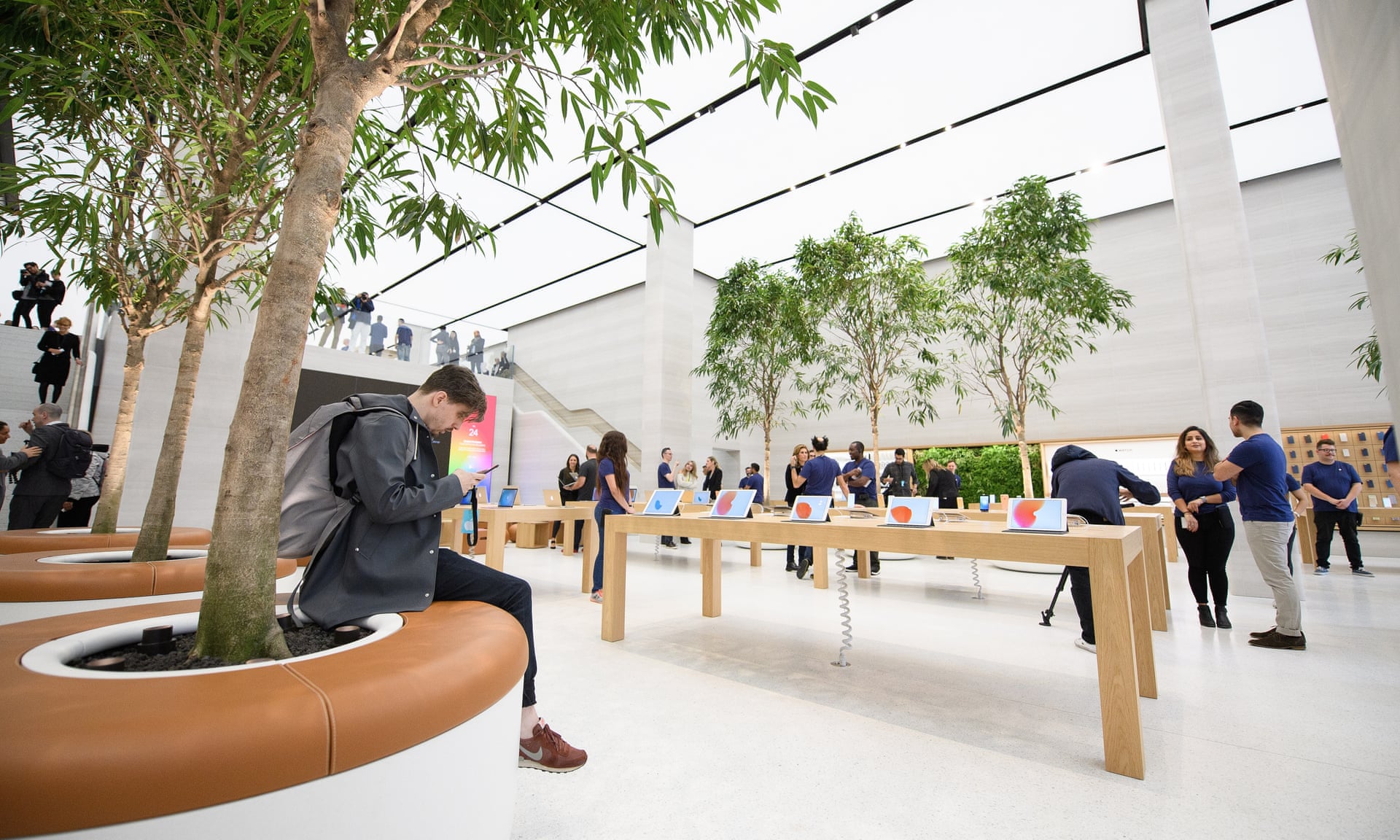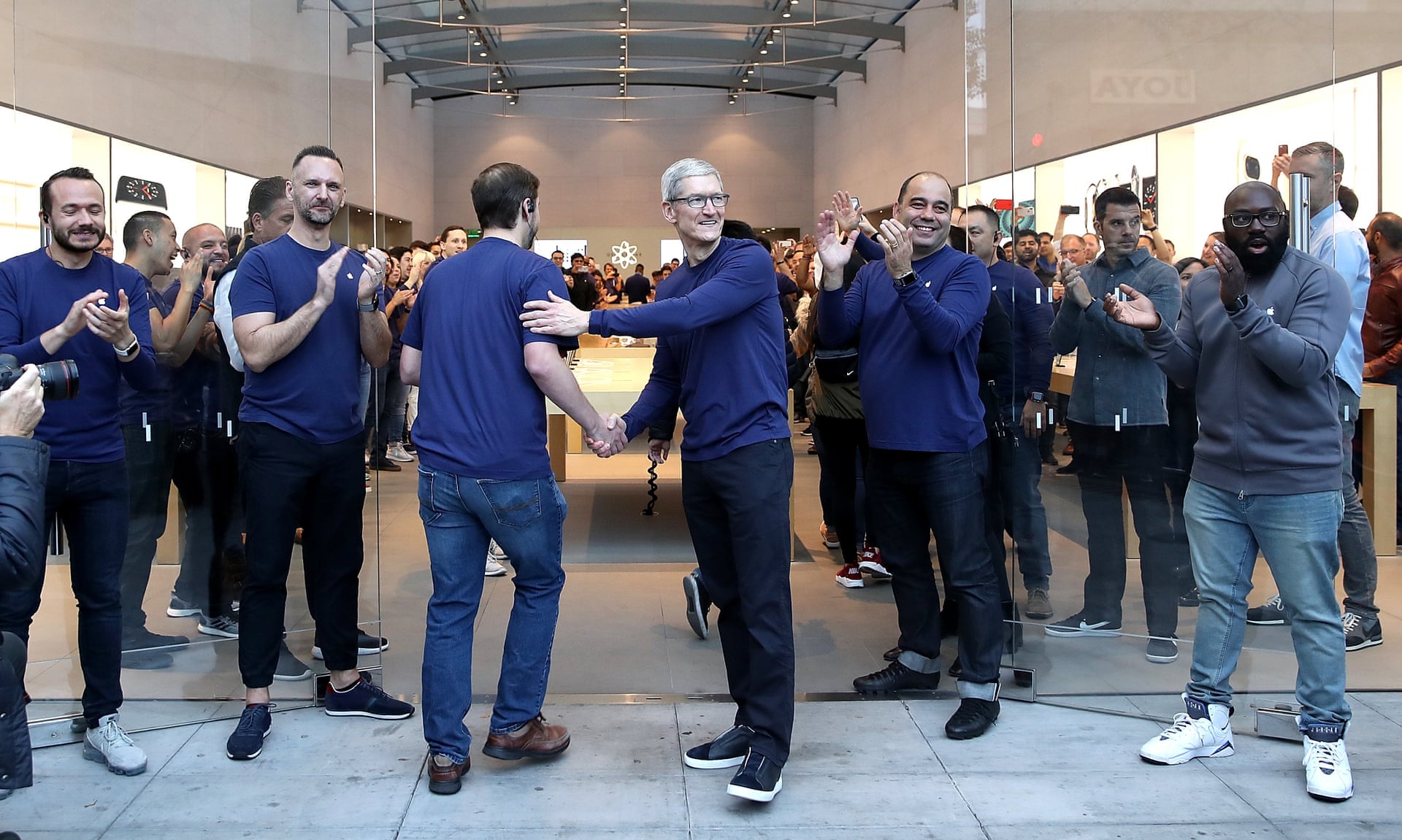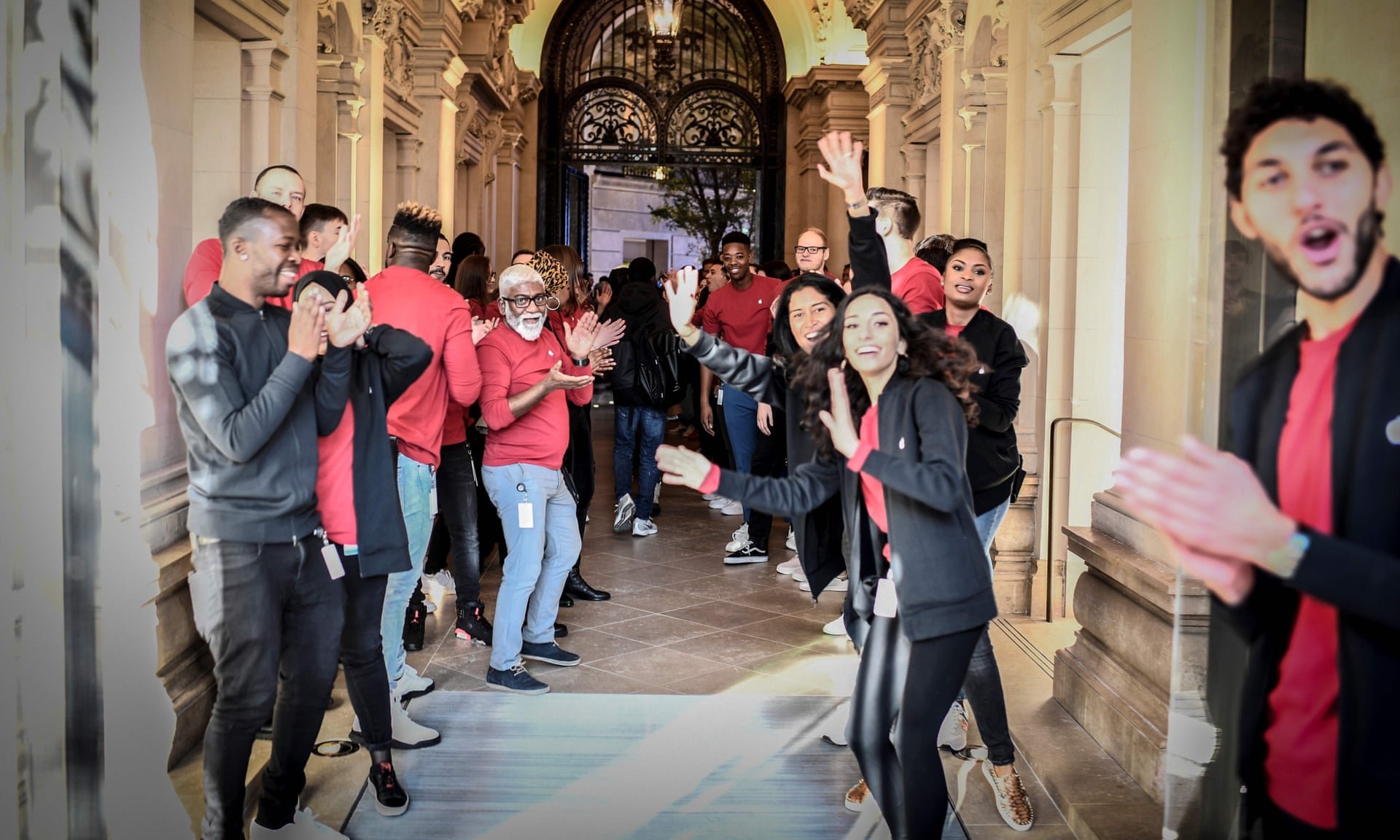Applause and cheers: carefully managed drama in Apple stores
- Transfer
These over-advertised "geniuses" in the sleek and sleek Apple store get less than expected, and play the role of characters in a well-designed fairy tale.

The updated Apple store in London acquired trees in a “grove of geniuses”, and aims to become a place where people just spend time.
Steve Jobs wanted a customer to understand Apple at first glance as if he was standing on Mount Olympus. And the shops, like, really speak for themselves. Bright, spacious, with glass trim - more contrast with the giant maze shops, which they had to replace, and can not be desired.
Like big profits. Since their launch in 2001, stores that were recognizable at first glancemore money - both in the amount and in terms of square meter - than any retailer on the planet, turning Apple into the richest company in the world. However, this transparency of the Apple store at the same time hides how these profits are made.
When thinking about technology, we rarely think about retail stores, and when thinking about “technology workers”, we rarely remember “geniuses” with a small salary working in these stores. Most of the media stories about tech companies make us forget that most of the employees of these companies are not programmers from Silicon Valley. These are self-destructive phone builders, call center employees, couriers and smiling salespeople who make up the bulk of Apple’s workforce.

Apple CEO Tim Cook welcomes shoppers to Palo Alto, California, while vendors applause first iPhone X shoppers
Apple Store was specifically designed as a brand embassy, and not as a source of technical knowledge. As Ron Johnson, former director of Target who developed this concept, told the Harvard Business Review newspaper, “People go to the Apple store for sensations - and are willing to pay for it at the highest level. Apple is a relationship business just as much as a technical business. ”
Johnson and Jobs wanted to get ambassadors whose ostentatious role was not to sell goods - the uniqueness of their work scheme is that they do not receive commissions from sales - but create a positive attitude among customers and return faith to the brand if it sways. It would be difficult to do if the store personnel were shoved together with other vendors into a huge electronics store, and worked under the supervision of outside managers who have neither interest nor knowledge in the field of the product being sold.
The goal was to take complete control over the brand image and humanize it. The problem was that people are difficult to manage.
Fortunately for Apple, some have worked to fix this bug. In 1984, several professors from the Harvard Business School published a book, Human Resource Management, aimed at updating the organization of the workplace, suitable for a new era. The book was based on the first for a whole generation of new compulsory course, which began to read at school in 1981. Ron Johnson began his MBA studies at Harvard the following year, and graduated the year he graduated.
The book stated that previously discipline from workers could be achieved by a simple way of pressure from top to bottom, but now this requires a different approach. “The restrictions of the hierarchy made it necessary to go in search of other mechanisms of social control,” the authors said. The mechanisms proposed by them were to treat employees as nominal shareholders of the company's business success, but within narrow limits that should increase and not threaten the income of shareholders.
Johnson put many of these ideas into practice. He founded the first cohort of Apple store workers, personally communicating with each manager, and offering jobs to people who worked for competitors. He led the top five managers through the Ritz-Carlton training program to get concierge skills. Then he developed a training program for the self-education of "geniuses". (It is said that Jobs first hated this term, considering it ridiculous. However, the next day he instructed lawyers to file an application for a trademark).
How to create an enthusiastic, happy, knowledgeable workforce, able to pass for a whole battalion of geniuses in many cities of the country? And, more importantly, how to do it without resorting to the carrot of an authoritarian boss or a carrot of an attractive percentage of sales?
Apple decided to cultivate a sense of involvement in the pursuit of a higher goal, while flattering employees, saying that they are among the elect, who deserve to represent it. Raising the bar for recruitment, conducting numerous interviews to sift out misanthropes and ordinary mercenaries, Johnson soon managed to attract more candidates than it was possible to accept. Those who were able to sneak through all the hiring were, by definition, better “fit” to represent the religious nature of the brand, and better succumbed to the tale they did not sell things, but, as they often say, “enriching people's lives”, as if they did charity work.

Apple employees applaud greeted customers in a new store in Paris
“When people are hired,” explained Johnson, “they consider it an honor to get into this team, and the team immediately respects them for having passed through the ranks.” This is not at all what to look for a cheaper employee who can work on a Saturday from 8 to 12. ”
And although the wages of these workers are not the lowest, they are quite low compared to the average wages in the industry, with the money they make for the company, and with the $ 400 million earned by Johnson himself for seven years at Apple.
Wages below average have another, less obvious effect. As the store managers of the New York Times explained, the lack of a sales commission means that income from work is not enough to keep people with financial problems afloat. Older workers are excluded automatically, without the need to prescribe this in the rules - and without the risk of getting a wide range of claims due to discrimination. Psychology, rather than trying to maximize economic rationality, allowed the company to turn hiring and salary into administrative tools.
A sense of vocation from above and flattery, of course, do not end after hiring. When you go through this process, the store workers greet you with applause: they give you a standing ovation, as if you won a prize. Applause, as employees say, continues until the newcomers, perhaps after some awkward hitch, begin to clap themselves, turning from a casual observer into a part of what is happening - becoming part of the team. If you leave the company, you too are applauded.
Applause also greeted products, visitors who waited all night in a queue, the buying process, and applause themselves. Clap, clap, clap. "My hands ached from all these applauses," said one of the managers. Claps , cheers,the image of enthusiastic engagement should provide a ready-made social glue that connects the teams, reaffirming the brand's spirit and cult devotion to the company's employees.
One would expect that Apple store employees, as their name implies, would be technology gurus and owners of incredible intelligence. But their true role is to use emotional tricks to sell a product.
“Tutorial for future geniuses” is a slightly comical name of the instruction, according to which Apple store employees learn their art. Future geniuses are taught to use empathic communication to control the client's perception and to relieve tension, in order to make him happy and relax the string of his wallet.

“Genius” at the Apple store in the World Trade Center helps the customer.
One of the techniques the book teaches is called “Three F”: feel, felt, found [feel, feel, find]. One example of a book that trainees learn by role:
Client : This Mac is just too expensive.
Genius : I understand why you could feel that way . I also felt that the price was a bit high, but I found that it has real value thanks to all the features of both himself and the pre-installed programs.
When customers have a problem with the product, geniuses are encouraged to show sympathy, but only apologizing for the unpleasant feelings of customers, so as not to emphasize that the cause of the problems is Apple products. And in the process of this implementation of a “problem-free” brand philosophy, many words are forbidden for employees to use.
Employees are asked not to use words such as failure, hang, bug, problem. Instead, they are asked to say “not responding,” “stopped responding,” “state,” “question,” or “situation.” Do not say "incompatible" - say "he does not work with him."
Employees talk about absurd dialogues that may arise as a result of such requirements. For example, they cannot be told to customers that they cannot help them, even in the most hopeless cases, because of which customers are drawn into conversations in a circle in which workers can neither help a person nor refuse to do it.
Apple geniuses perform on the stage, which is controlled as carefully as they themselves. Jobs and Johnson wanted to control every aspect of Apple's stores, right down to the color of the plates on the toilet doors. Almost all parts are registered as trademarks, from stairs to shop windows and racks. Even an allegedly “intuitive” store plan, so obvious that everyone can understand it, is considered unique enough to fall under the law.on intellectual property protection.

The new Apple store on the Champs-Elysées will be the largest in Paris and should become the company's flagship store in France.
In particular, to overcome a drop in sales in a saturated market, for the last two years Apple has carefully redesigned its stores to make them work even harder. Potted trees were set up to add a bit of green to the branded gray, and, according to a new idea, so ridiculous that it would surely become a hit, “Bar of Geniuses” was renamed “Grove of Geniuses”. The windows are open to demonstrate the difference between the outside world and the interior, while the stores themselves are advertised as pseudo-public places.
“We don’t even call them more stores,” said the head of Apple’s retail division, former director of Burberry, Ejela Arendts (salary for 2017: $ 24,216,072). "We call them city squares."
Town Square. The symbol of public civil life, almost attractive for its old-fashioned character, is so far from large stores that characterized the image of retail at the end of the 20th century and even from the digital isolation of the 21st century. Apple's goal was to create a space for people where they can just spend time expanding the original idea that concentrating on everything except money will paradoxically help them attract even more.
According to Arendts, “the store unites with the community”. However, the main hopes, apparently, are placed on the opposite - that the community will unite with the Maagsin.
After Apple recently won the race by breaking $ 1 trillion capitalization, Tim Cook sent a letter to the staff, explaining that “financial success is simply the result of Apple’s innovation, customer priority and product, and the company's loyalty to its values.”
But, no matter how seductive this story is, it, like the Apple stores themselves, is just a controlled fairy tale.
The scheme of work of the company is based not on genius, but on capture and control. Semiconductors, microprocessors, hard drives, touch screens, the Internet and its protocols, GPS: all these ingredients of Apple's incredible profitability were paid for with public money, which was poured into research through a Keynes Institute like the US Army. They serve as the basis of Apple products, as shown by economist Mariana Matstsukato .
The incredible wealth of the company is not just a reward for innovation, or a legacy of “innovators” like Steve Jobs. It stems from the privatization of research financed with state money, mixed with the ability to manage the low-paid labor of Chinese colleagues, and the work of empathic sellers who are forbidden to say “refusal”. Profits from this activity are kept offshore, are not taxed, and are returned only to enrich people who have enough money to invest.
However, when the public well, from which the previous innovations were drawn, dries up, the company's ability to repeat the success of the iPhone evaporates. Government funding of research projects is in deep decline, and Apple is unlikely to be able to fill this gap.
To maintain profitability, Apple moves to ever more luxurious prices for less serious improvements (such as the iPhone XS Max) and expands opportunities to generate income from other people's work (through Apple Music or the App Store, from which you can’t exit without getting into the hell of windows). And all this time, the embassies of this brand with a smile are selling a new fairy tale.
